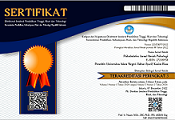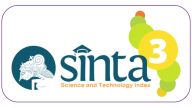Penggunaan Life Orientation Test-Revised (LOT-R) versi Indonesia: Reevaluasi Validasi dengan Rasch Rating Scale Model
Abstract
Proses adaptasi instrumen Life Orientation Test-Revised ke dalam bahasa Indonesia telah dilakukan pada tahun 2021. Proses adaptasi tersebut memiliki kekurangan dari sisi diagnostik rating scale-nya yang tidak memenuhi batasan statistik. Oleh sebab itu, tujuan penelitian ini untuk melakukan analisis validasi ulang instrumen LOT-R yang telah di adaptasi dengan karakteristik sampel yang berbeda. Desain penelitian yang digunakan adalah a survey-base study research with self reported response. Sebanyak 342 mahasiswa tingkat strata satu didapatkan dengan teknik sampling convinience. Hasil analisis dengan Rasch Rating Scale Model menemukan LOT-R memiliki kualitas properti psikometri yang baik dengan terpenuhinya dua asumsi wajib, nilai rentang threhold yang sesuai untuk masing-masing pilihan jawaban, seluruh itemnya memenuhi index model fit dengan kriteria yang tepat dan reliabel. Penggunaan LOT-R versi Indonesia secara keseluruhan layak digunakan untuk mengukur optimis pada mahasiswa di Indonesia.
Keywords
Full Text:
PDFReferences
Bastianello, M. R., Pacico, J. C., & Hutz, C. S. (2014). Optimism, self-esteem and personality: Adaptation and validation of the Brazilian Version Of The Revised Life Orientation Test (LOT-R). Psico-USF, 19(3), 523–531. https://doi.org/10.1590/1413-827120140190030
Boroel, B., Aramburo, V., & Gonzalez, M. (2017). Development of a scale to measure attitudes toward professional values: An analysis of dimensionality using Rasch measurement. Procedia - Social and Behavioral Sciences, 237, 292–298. https://doi.org/10.1016/j.sbspro.2017.02.079
Carver, C. S., & Scheier, M. F. (2014). Dispositional optimism. Trends in Cognitive Sciences, 18(6), 293–299. https://doi.org/10.1016/j.tics.2014.02.003
Chen, Y., Su, J., Ren, Z., & Huo, Y. (2019). Optimism and mental health of minority students: Moderating effects of cultural adaptability. Frontiers in Psychology, 10, 2545. https://doi.org/10.3389/fpsyg.2019.02545
Duncan, P. W., Bode, R. K., Min Lai, S., & Perera, S. (2003). Rasch analysis of a new stroke-specific outcome scale: The stroke impact scale. Archives of Physical Medicine and Rehabilitation, 84(7), 950–963. https://doi.org/10.1016/S0003-9993(03)00035-2
Gallagher, M. W., Lopez, S. J., & Pressman, S. D. (2013). Optimism is universal: Exploring the presence and benefits of optimism in a representative sample of the world. Journal of Personality, 81(5), 429–440. https://doi.org/10.1111/jopy.12026
Ghazal, H. A. A., & Al-Majali, M. K. (2018). Optimism in Sūrat Al-AḤzāb. Dirasat, 45(2), 321–332.
Glaesmer, H., Rief, W., Martin, A., Mewes, R., Brähler, E., Zenger, M., & Hinz, A. (2012). Psychometric properties and population‐based norms of the Life Orientation Test Revised (LOT‐R). British Journal of Health Psychology, 17(2), 432–445. https://doi.org/10.1111/j.2044-8287.2011.02046.x
Hanssen, M. M., Vancleef, L. M. G., Vlaeyen, J. W. S., Hayes, A. F., Schouten, E. G. W., & Peters, M. L. (2015). Optimism, motivational coping and well-being: Evidence supporting the importance of flexible goal adjustment. Journal of Happiness Studies, 16(6), 1525–1537. https://doi.org/10.1007/s10902-014-9572-x
Hassan, H. M. (2016). Investigation of the self-reported aberrant driving behavior of young male Saudi drivers: A survey-based study. Journal of Transportation Safety & Security, 8(2), 113–128. https://doi.org/10.1080/19439962.2015.1017782
Hinz, A., Sander, C., Glaesmer, H., Brähler, E., Zenger, M., Hilbert, A., & Kocalevent, R.-D. (2017). Optimism and pessimism in the general population: Psychometric properties of the Life Orientation Test (LOT-R). International Journal of Clinical and Health Psychology, 17(2), 161–170. https://doi.org/10.1016/j.ijchp.2017.02.003
Holster, T. A., & Lake, J. (2016). Guessing and the Rasch model. Language Assessment Quarterly, 13(2), 124–141. https://doi.org/10.1080/15434303.2016.1160096
Lai, J. C. L., Cheung, H., Lee, W., & Yu, H. (1998). The utility of the Revised Life Orientation Test to measure pptimism among Hong Kong Chinese. International Journal of Psychology, 33(1), 45–56. https://doi.org/10.1080/002075998400600
Leung, B. W.-C., Moneta, G. B., & McBride-Chang, C. (2005). Think positively and feel positively: Optimism and life satisfaction in late life. The International Journal of Aging and Human Development, 61(4), 335–365. https://doi.org/10.2190/FQTB-EBAJ-H9WP-LMYA
Márk B., & Köteles F. (2010). The measurement of optimism: The psychometric properties of the Hungarian version of the Revised Life Orientation Test (LOT–R). Magyar Pszichológiai Szemle, 65(2), 273–294. https://doi.org/10.1556/mpszle.65.2010.2.7
Millstein, R. A., Chung, W.-J., Hoeppner, B. B., Boehm, J. K., Legler, S. R., Mastromauro, C. A., & Huffman, J. C. (2019). Development of the State Optimism Measure. General Hospital Psychiatry, 58, 83–93. https://doi.org/10.1016/j.genhosppsych.2019.04.002
Mishra, K. K. (2013). Gender and age related differences in optimism and good life. Indian Journal of Social Science Researches, 10(1), 9–17.
Mohd, R., Bakar, N. A., Hassan, S., & Hussain, A. H. (2017). Sustainable post-disaster recovery plan for flood victims in Gus Musang and Kuala Krai, Kelantan. Pertanika Journal of Social Sciences & Humanities, 25(S), 1–12.
Othman, H., Ismail, N. A., Asshaari, I., Hamzah, F. M., & Nopiah, Z. M. (2015). Application Rasch measurement model for reliability measurement instrument in vector calculus course. Journal of Engineering Science and Technology, 10(2), 77–83.
Palacios-Delgado, J., & Acevedo-Ibarra, J. N. (2023). Psychometric properties of a New Mexican Optimism Scale: Ethnopsychological approach. European Journal of Investigation in Health, Psychology and Education, 13(12), 2747–2764. https://doi.org/10.3390/ejihpe13120190
Parveen, F., Maqbool, S., & Khan, S. M. (2016). Optimism as predictor of psychological well being among adolescents. International Journal of Indian Psychology, 3(4), 12–21. https://doi.org/10.25215/0304.154
Rawat, R., & Mahapatra, M. (2020). Role of optimism in self esteem and self efficacy of older adults. International Journal of Psychosocial Rehabilitation, 24(8), 7762–7769. https://doi.org/10.37200/IJPR/V24I8/PR280788
Rogers, H. J., & Swaminathan, H. (1990). A Comparison of logistic regression and Mantel-Haenszel procedures for detecting differential item functioning. Applied Psychological Measurement, 17(2), 105–116. https://doi.org/10.1177/014662169301700201
Scheier, M. F., Carver, C. S., & Bridges, M. W. (1994). Distinguishing optimism from neuroticsim (and trait anxiety, self-mastery, and self-esteem): A re-evaluasi of the Life Orientation Test. Journal of Personality and Social Psychology, 67, 1063–1078. https://psycnet.apa.org/doi/10.1037/0022-3514.67.6.1063
Schreiber, J. B., Nora, A., Stage, F. K., Barlow, E. A., & King, J. (2006). Reporting structural equation modeling and confirmatory factor analysis results: A review. The Journal of Educational Research, 99(6), 323–337.
Suryadi, B., Hayat, B., & Putra, M. D. K. (2021). The Indonesian version of the Life Orientation Test-Revised (LOT-R): Psychometric properties based on the Rasch model. Cogent Psychology, 8(1), 1869375. https://doi.org/10.1080/23311908.2020.1869375
Tetzner, J., & Becker, M. (2018). Think positive? Examining the impact of optimism on academic achievement in early adolescents. Journal of Personality, 86(2), 283–295. https://doi.org/10.1111/jopy.12312
Van Zile-Tamsen, C. (2017). Using Rasch analysis to inform rating scale development. Research in Higher Education, 58(8), 922–933. https://doi.org/10.1007/s11162-017-9448-0
Wicaksono, D. A., Roebianto, A., & Sumintono, B. (2021). Internal validation of the Warwick-Edinburgh Mental Wellbeing Scale: Rasch analysis in the Indonesian context. Journal of Educational, Health and Community Psychology, 10(2), 229–248. https://doi.org/10.12928/jehcp.v10i2.20260
Wrosch, C., & Scheier, M. F. (2003). Personality and quality of life: The importance of optimism and goal adjustment. Quality of Life Research, 12(1), 59–72.
DOI: http://dx.doi.org/10.24014/pib.v6i2.28880
Refbacks
- There are currently no refbacks.
Redaksi Psikobuletin: Buletin Ilmiah Psikologi
Publisher: Universitas Islam Negeri Sultan Syarif Kasim Riau
Jl. H.R. Soebrantas Km. 15.5 No. 155 Gedung Fakultas Psikologi UIN Sultan Syarif Kasim Riau Kel. Tuahmadani Kec. Tampan Pekanbaru - Riau 28293.
E-mail : psikobuletin@uin-suska.ac.id / Website :http://ejournal.uin-suska.ac.id/index.php/Psikobuletin
Psikobuletin : Buletin Ilmiah Psikologi by Fakultas Psikologi is licensed under a Creative Commons Attribution 4.0 International License.



31.png)





